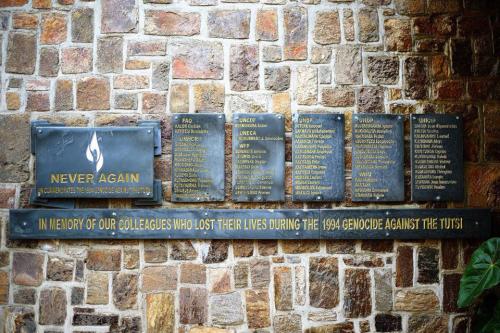Reflecting on Rwanda, Ban urges courage ‘to counter the cruelty taking place before our eyes’
The world must make use of the International Day of Reflection on the Genocide in Rwanda to look back on the past – and to squarely confront the challenges of the present, renewing collective resolve and summoning the courage to prevent such atrocities from happening again, United Nations Secretary-General Ban Ki-moon said on 7 April, 2015.

The UN family in Rwanda commemorates the 21st anniversary of the genocide.
“Our annual sombre observance is all the more meaningful this year as we mark the 70th anniversary of the founding of the United Nations, said Mr. Ban in his message on the Day, which honours the memory of the more than 800,000 people – overwhelmingly Tutsi, and also moderate Hutu, Twa and others – systematically killed across Rwanda in less than three months just over two decades ago. It is also an occasion to recognize the pain and the courage of those who survived.
The Secretary-General’s message previews the 21st Commemoration of the Rwanda Genocide Memorial Ceremony, taking place at UN Headquarters this evening from 6:00 p.m. to 7:00 p.m.
Organized by the UN Department of Public Information, in cooperation with the Permanent Mission of Rwanda to the United Nations, the programme will include, among others, Mr. Ban, Sam Kutesa, President of the UN General Assembly, and Eugène-Richard Gasana, Ambassador of Rwanda and Minister in Charge of Cooperation.
In his message, Mr. Ban stressed that many countries today face grave security threats, with people being subjected to the brutality of violent conflicts and the indignities of poverty.
Discrimination persists in societies torn apart by war, as well as in democracies that largely enjoy peace. Hatred may manifest as institutionalized racism, ethnic strife, or episodes of intolerance or exclusion. In other instances, discrimination reflects the official, national version of history that denies the identity of some segments of the population.
“I deplore the conflicts and atrocity crimes in many parts of the world that continue to divide communities, killing and displacing people, undermining economies and destroying cultural heritage,” declared the Secretary-General, emphasizing that the international community’s first duty is always to prevent these situations and to protect vulnerable human beings in distress.
“My Human Rights Up Front initiative seeks to prevent serious human rights violations by acting on early warning signs before they become more serious,” he explained, adding that his Special Advisers on the Prevention of Genocide and on the Responsibility to Protect work to advance national and international efforts to protect populations from atrocity crimes.
“We aim to ensure swift and decisive action to save lives and stop abuses,” stressed the UN chief.
“On this Day, I appeal to the international community to do more than just speak about atrocity crimes and then fail to take timely action to prevent them. I call on all to summon the courage to act before situations deteriorate based on our collective moral responsibility. This is critical for the maintenance of international peace and security,” he said, recalling that at last year’s commemoration in the Rwandan capital, Kigali, he had urged the world to exercise ‘Umuganda’– coming together in common purpose – “to avert what can be prevented and counter the cruelty taking place before our eyes.”
Source: United Nations
- 431 reads
Human Rights
Fostering a More Humane World: The 28th Eurasian Economic Summi

Conscience, Hope, and Action: Keys to Global Peace and Sustainability

Ringing FOWPAL’s Peace Bell for the World:Nobel Peace Prize Laureates’ Visions and Actions

Protecting the World’s Cultural Diversity for a Sustainable Future

Puppet Show I International Friendship Day 2020

